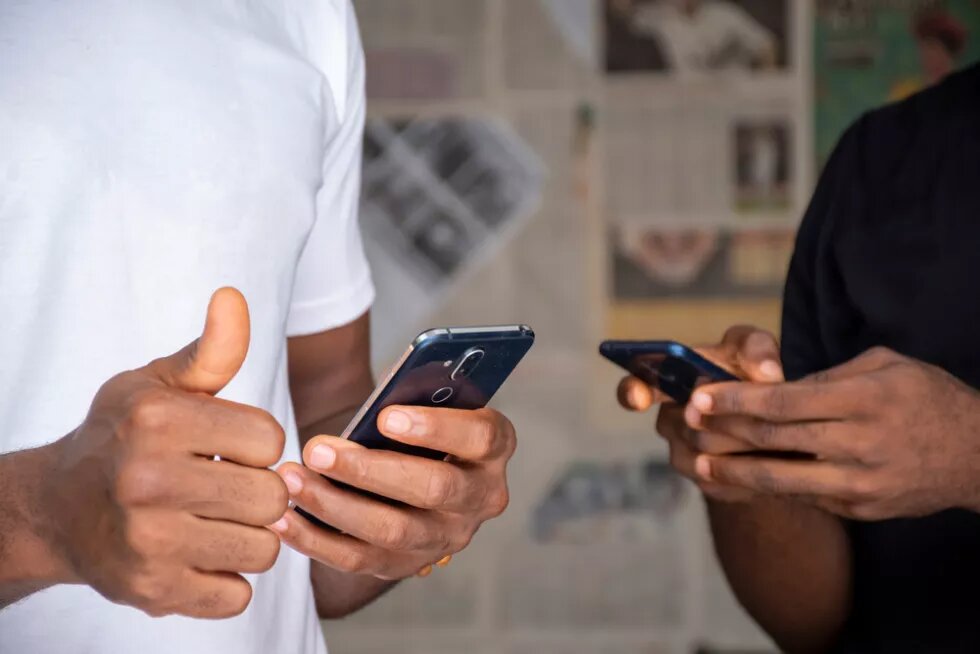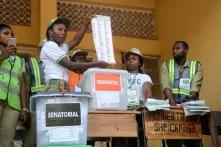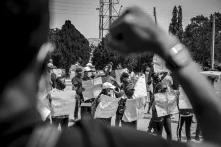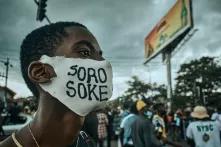The use of social media has become a defining feature in Nigeria’s electoral politics. We spoke to Dr. Tobi Oluwatola, executive director of the Centre for Journalism Innovation and Development (CJID), about the impact this has had on the election process and what to look out for in 2023.

How significant is social media in Nigerian electoral politics?
Social media has been significant in Nigeria’s electoral politics since 2011, inspired by the election of Barack Obama by the Facebook generation in 2008.
Today, the Nigerian Communications Commission estimates that there are almost 150 million internet users in Nigeria. Active social media users – excluding about 90 million WhatsApp users – are estimated at approximately 32 million as of January 2022, based on data compiled by DataReportal, an online reference library. This includes about 26 million Facebook users, 9 million on Instagram, 6 million on LinkedIn, and 9.5 million on Snapchat. The potential audience Twitter says theirs ads can reach in Nigeria is 4.25 million. More significantly, compared with the rest of the world, the average Nigerian social media denizen spends a lot more time on social media – about 4 hours daily. With more than a third of the voting population spending copious amounts of time on social media, it is only logical that politicians take their messaging to where the people are.
A 2015 study by Demos, a UK-based market research firm, revealed that Twitter was ten times more active during the 2015 election period in Nigeria than in normal times. Social media users tweeted over 12.4 million tweets about the elections over the period and 216,000 Facebook users interacted with content on popular public pages related to the elections.
The same scenario seems to unfold in the build-up to the upcoming 2023 general elections. The three major presidential candidates – Peter Obi, Atiku Abubakar, and Bola Ahmed Tinubu – have significantly increased their followership on Facebook and Twitter in the last six months. Hashtags directly related to candidates trend on local Twitter and Facebook almost daily.
These numbers and trends highlight the significance of social media in electoral politics in Nigeria.
How does the electorate make active use of social media during elections?
Citizens use social media platforms to give daily reports and updates regarding election circumstances. In recent times, ordinary Nigerians have monitored electoral situations in real-time across the country. They have tagged relevant bodies such as Independent National Electoral Commission (INEC), security agencies, news channels, international organisations, etc. via social media platforms to take action.
A good example is the recent 2022 Osun State gubernatorial election. INEC, security agencies and other relevant organisations were instantly responding to queries made by ordinary citizens on social media platforms. This has positioned social media as an important instrument in the hands of citizens to ensure electoral integrity in the country.
The Department of State Services has described social media and the proliferation of fake news as a major threat to the 2023 elections. What is your evaluation of the extent of the problem?
I share the concern. There are many different ways in which disinformation spread through social media threatens the 2023 elections.
For example, we expect to see political parties use disinformation to dissuade voters from coming out in opposition strongholds with the threat of violence or simply false information about the electoral processes. Examples of this have already been seen in past elections and we expect it to be intensified.
There are also already a lot of accusations targeted at the electoral umpire. INEC is portrayed to be biased and there are calls for the chairman’s resignation. We can expect that, regardless of the fairness of the election, there will be broad mistrust in the process, which could fuel protests and unrest following the announcement of results.
Finally, in every election, candidates always use false information to discredit their opponents and embellish their records, with or without veracity. Incidents of these are already rife in the political space.
Social media bots and their influence on elections have become a much-talked-about phenomenon. What role do they play in Nigeria’s election?
Our analysis of popular hashtags related to the major political candidates of the 2023 general elections revealed bot operations. Hashtags such as #BATified, #Obidient, #Atikulated, #kwankwasiya, etc. were found to have been driven by bots. This camouflaged scheme is likely to intensify as the elections draw closer.
We also carried out a bot analysis on the major candidates, using Botometer and Botsight tools, and found there are more than 1 million bots following them on Twitter. Bola Ahmed Tinubu, the All Progressives Congress candidate, had one million followers as of February 2022. Currently, he has 1.4 million followers: an addition of 400,000 followers within eight months. Our bot analysis revealed 17.1% (248,000) of the followers as bots, fake accounts created within that period.
Peter Obi had 705,600 followers as of February 2022. Currently, the Labour Party candidate has 2 million followers, a tremendous increase of 1.3 million followers within eight months. Analysis of these followers revealed that 26.55% (531,000) are bots. These are fake accounts created to follow Mr. Obi on Twitter. The same picture emerges across all the candidates.
These bots are able to trend any topic quickly and create an illusion of a movement out of what may be a fringe view. This is known as “astroturfing”. Although most of these bot accounts are currently inactive – i.e., zero tweets, limited followers and low retweets – we believe this to be a deliberate scheme by political actors to influence and direct online political conversations in their favour as they prepare for the forthcoming general election in 2023.
Aside from the use of bots, what other instruments fuel the disinformation machinery?
Our analysis finds paid and unpaid political influencers to be the chief spreaders of fake news, exposing a deliberate effort by some actors to fuel mis- and disinformation that sits in favour of their preferred candidate or is targeted at damaging the image of their opponents.
We have noted systematic and planned networks for organised misinformation campaigns, particularly related to one candidate. Aside from the ones we have uncovered, we believe there are more networks out there and more will soon become visible.
Another emerging tool is “deep fakes” – AI-assisted footage that bears the face of political actors speaking structured and assigned statements. Over 50 claims we have fact-checked, directly related to forthcoming 2023 general elections, have doctored images and videos attached. Some of them are merely taken out of context to mislead the public. A few claims we have recently verified were, in fact, deep fakes.
All of these instruments feed on people’s confirmation biases. People want to share or forward information that favours their preferred candidate, not minding whether or not it is accurate.
Bills such as the so-called “Social Media” and “Hate Speech” Bills have been introduced by lawmakers as a response to the fake news phenomenon but were heavily criticised for threatening freedom of speech. How do you suggest fake news be tackled in Nigeria?
There is credible precedent for legislating legal penalties for hate speech and fake news. One example is Canada’s Criminal Code section 181, which spells out that people who wilfully spread false statements that cause injury to a public interest can be sent to prison for up to two years.
The core challenge with using government regulation to curb fake news and hate speech is that the very same tools of government can be weaponised to curb truth and suppress freedom of speech. This is true anywhere in the world but particularly pertinent in Nigeria’s context. Therefore, we at CJID do not encourage legal penalties. Instead, alternative instruments such as media literacy programmes, making true information more readily available, working with technology companies on content moderation, and data-based media monitoring should be much more explored.
The impact of such interventions will take time to develop. What role can political candidates, parties, the media and citizens play to reduce the threat of fake news during the upcoming election?
The only rule in Nigerian politics is to win. So you would be wishing upon a star to expect politicians not to deploy all information tools possible, including propaganda or fake news, to secure victory.
However, it is the job of the media and electoral management bodies, to make sure the truth is in the public domain. Political parties and candidates can be proactive in working with the media to swiftly react to fake news that affects them or their party. Fake news thrives when there is a dearth of information. A timely response, regular updates and a viable information-delivery team will drastically reduce the spread of fake news.
Fake news is less impactful when it does not go viral. Nigerians, especially the ones active on social media, can mitigate the spread of fake news when they share or reshare only verified information, not minding whether it conforms to their political biases or goes against them.
Media organisations must ensure they disseminate accurate and reliable information during elections. All contents should be objective, truthful, factual, and based on the principles of journalism. As a matter of urgency and essence, media organisations should set up fact-checking desks to prepare for the influx of fake news ahead of the 2023 general elections.
The views expressed are those of the interviewee and do not reflect the views or position of the Heinrich Boell Foundation.


